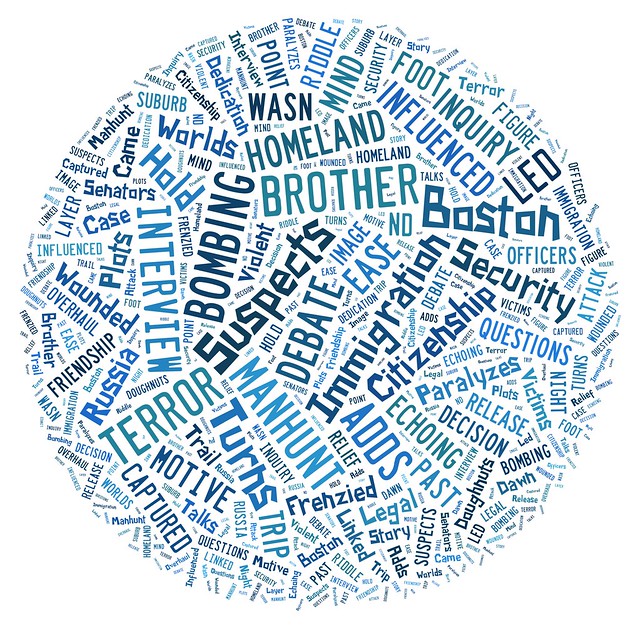Because I am perpetually fixated on the Kennedy family and because I am also perpetually fixated on my home state of Massachusetts, I decided to look at two tragic events of particular interest to residents past and present of the Bay State.
I elected to look at the headlines to New York Times articles that mentioned Lee Harvey Oswald on the day he was killed by Jack Ruby, as well as the day after. I created a word cloud to get an idea of what terminology came up often in those headlines and what was sort of secondary. I was interested in the ways in which the NY Times talked about Oswald and news pertaining to him. This is what I got:

I then went through the New York Times archive from the day Tamerlan Tsarnaev was killed (either by Boston Police or by his brother Dzhokhar) and pulled out those headlines to see the ways in which articles pertaining to him framed the event. I wanted to see differences in discussions of this tragedy and one that had occurred almost 50 years earlier. Here's that word cloud:

I won't paste all the actual headlines here, but the differences and similarities are interesting. Both incidents involved connections to Russia, so in the Boston bombing word cloud, Russia appears several times, and in the Kennedy assassination word cloud, we see SOVIET featured prominently. We also see the word "citizenship" come up in both word clouds, although it occurred far more often in Boston bombing related articles than in JFK related articles. Obviously, in 1963, much of the worry about Russia and the Soviets was specifically related to communism, whereas in our current social milieu immigration, Islam, and terrorism are ever-present fears. Thus, while citizenship would certainly have entered the discussion of Oswald (and his wife Marina), the extremely fraught issue of immigration is of more central concern in the modern articles.
You can also see in the older articles that the NY Times had no problem very conclusively stating Oswald's guilt, and frequently brought up the police, the detectives, and the evidence their fine work had brought against him. In the case of the Boston bombing, they are repeatedly called "suspects" and it is not law enforcement that takes center stage (although "manhunt" is obviously a frequently used term). The political implications are much stronger -- e.g. "Senators," "Homeland Security," "immigration."
Of course, the differences in language is not ONLY because of time. It also has to do with race, religion, and the nature of terrorism (in the context of a bomb "plot" consisting of multiple actors, as opposed to a "lone wolf" like Lee Harvey Oswald). It would be interesting to also compare these incidents to something like, say, Sandy Hook, Aurora, and/or Christopher Dorner, to give broader ideas of how lone wolf murderers are talked about in this day and age and how that would compare. Fortunately, we do not have another presidential assassination to make the stronger comparison.
Comments (0)
You don't have permission to comment on this page.